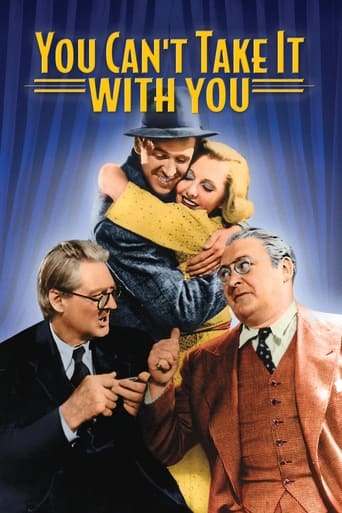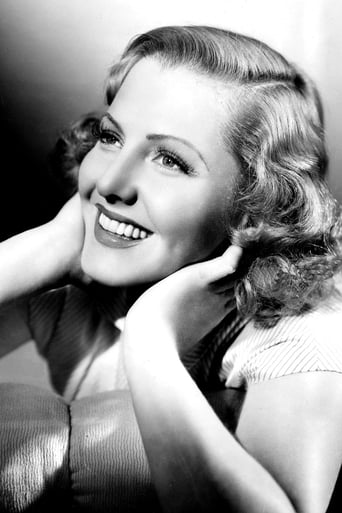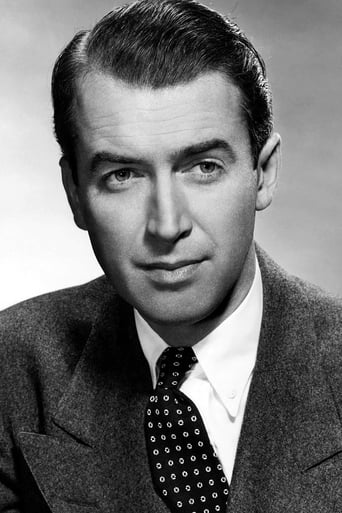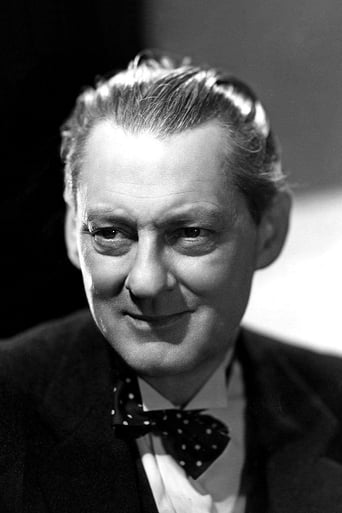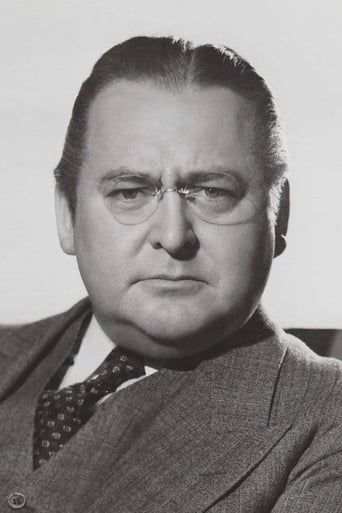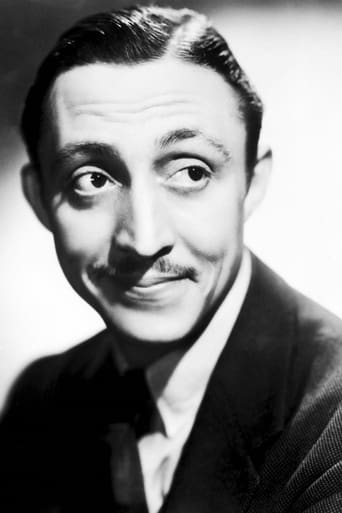Dorathen
Better Late Then Never
Breakinger
A Brilliant Conflict
Teddie Blake
The movie turns out to be a little better than the average. Starting from a romantic formula often seen in the cinema, it ends in the most predictable (and somewhat bland) way.
Phillipa
Strong acting helps the film overcome an uncertain premise and create characters that hold our attention absolutely.
saraccan
It's your typical rich family vs not rich family comedy. I guess it paved the way to creating this comedy sub-genre but after seeing so many i find it hard to really enjoy it anymore.It's about the two young lovers from families with different approaches in life and their struggle making their parents like each other.
disinterested_spectator
Though Frank Capra movies are typically classified as comedies, yet they really are not that funny. One reason is that they come across as homilies, and as there is nothing humorous about moralizing, there is an inconsistent tone throughout. Worse yet, the moral of his movies tends to be so simplistic as to have no practical value. Some of his movies are better than others, of course. But notwithstanding the fact that it got the Academy Award for Best Picture, this is not one of them.The message in this movie in particular is that everyone ought to just do whatever he wants to do. Well, I don't know about you, but if I did what I wanted to do, no one would pay me for it. I like watching movies and writing reviews like this, and if someone wants to pay me to do so, I'll be happy to take his money. But until I retired (and could finally do what I wanted), I spent thirty-five years holding down a job that wasn't much fun. It wasn't a bad job, as jobs go, but it was not what I wanted to do, which was mostly just take it easy and have a good time.The movie centers on a family that embodies this principle of doing whatever you want to do. Grandpa Vanderhof supposedly collects stamps and is able to make money off his expertise, even though it is not clear how. His daughter writes plays, though we doubt she publishes them. His son-in-law and another man fool around with firecrackers in the basement, supposedly selling them from time to time. One of his granddaughters, Essie, takes ballet lessons, so she represents an expense rather than providing an income. And so it goes. There is only one person in the household, Essie's sister Alice, who holds down a real job, as a secretary, which would seem to violate the principle of doing whatever you want to do; but in any event, her income could hardly support the rest of the household. I suppose I should mention they have a full-time maid, who also is their cook, and they live in a house worth $25,000 in 1938 dollars, which adjusted for inflation would be over $400,000 today (at one point they are offered $100,000 for the house, or about $1,670,000, adjusted for inflation).Doing what you want apparently includes not paying your income taxes. When an Internal Revenue Agent shows up to talk to Grandpa Vanderhof because he never files income tax returns, he says he doesn't believe in paying taxes because he doesn't care for the things the money is spent on. This completely confounds the IRS agent, as if the agency had never had to deal with that attitude before. When warned by Alice's fiancé, Tony Kirby, that he might get in trouble, Grandpa says he really doesn't owe the IRS any money. I guess that stamp-collecting expertise hasn't been all that remunerative after all.By now you may be thinking that I have missed the whole point, that this is just a comedy. Well, that brings us back to my original point. The movie just is not that funny. And because it is not very funny, I had time to reflect upon the sermon being preached by this movie, which I concluded was absurd for the reasons just given.The ridiculous moral lesson of this movie is not the only thing that works against the intended humor. The movie is more manic than funny. We are supposed to be delighted by this crazy household, when in reality, none of us could stand being in that living room for more than a few minutes. You would not have to be a stuffed shirt like Tony's father or a snob like Tony's mother to be appalled that your son wanted to marry into a family like that.
SnoopyStyle
Greedy Anthony P. Kirby (Edward Arnold) is trying to monopolize the weapons industry by buying up the land surrounding a competitor. Grandpa Vanderhof (Lionel Barrymore) is holding out. He doesn't care about money and refuses to sell his home. Unbeknownst to everybody involved, Kirby's son Tony (James Stewart) is in love with stenographer Alice Sycamore (Jean Arthur), the granddaughter. He proposes to her and they bring her eccentric family together with his stuffy family.I don't find the Vanderhof family that much fun. They're trying too hard. It's another time and my sense of humor doesn't fit. The movie works best with Stewart and Arthur but at times, they seem to be the side show. The basic structure is there. I guess it's always been there. It's a fine Capra movie but it just doesn't strike me as that funny.
The_Film_Cricket
Frank Capra's work a window on a time before American idealism was replaced by the more modern trend of cynicism, the age that was washed out by the devastating experiences of World War II, Vietnam and Watergate. This kind of early positive Americanism is long gone and it is such a gift to have Capra's work to remind us of a time long gone. In that way, his films are invaluable In 1934, Capra hit the ground running with "It Happened One Night", a film so successful and with such a far-reaching effect that it basically invented the institution of the screwball comedy and the romantic comedy. 80 years later, it still holds up. He won the Oscar for that film, and four years later won again for his adaptation of George Kaufman and Moss Hart's stage success "You Can't Take It With You", which had been so successful that it won the Pulitzer Prize. Capra's adaptation won Best Picture yet, while it contains all of Capra's trademark, time has not been kind and, in spite of its status in Oscar history it has more or less slipped into the dustbins of history.The movie isn't bad, just dated. The story is clunky with over-sized characterization and an antiquated theme about the value of friends over money. The story involves Capra's favorite kind of villain, the heartless corporate businessman, in this case a certain Anthony P. Kirby (Edward Arnold) The C.E.O. of Kirby and Co., a bank that seems to be booming despite the depression. Kirby wants to expand his business to get in on the munitions market and needs land to do it. He has been successful so far at buying out the residents except for one hold out who won't sell even when offered four times what the house is worth.The man causing the trouble is Martin Vanderhof (Lionel Barrymore), a genial Joe who plays the harmonica and refuses to work in favor of having fun. His reason for holding out on the sale is simple: He places a value on the memories that he has tied to the house over any kind of money that Kirby is willing to shell out. Kirby is the kind of bullish business man who doesn't take no for an answer and orders his underlings to get Vanderhof and his family out of the house by any means necessary.Meanwhile, Kirby's sweet-natured son Tony (Jimmy Stewart) has become engaged to Alice Sycamore, his secretary. Unknown to either party, Alice is actually Vanderhof's granddaughter. She's actually the only normal member of the family. The rest are defined by their quirks. Sister Essie (Ann Miller) dances everywhere she goes. Her husband Ed (Dub Taylor) plays the xylophone. Penny (Spring Byington), Alices's mother bangs away on the typewriter. Paul, Alice's father (Samuel S. Hinds), plays with erector sets. A defected Russian named Boris (Mischa Auer) hangs around the house and acts as Essie's dance instructor. And a new member of the household, Mr. Poppins (Donald Meek), likes to make things.Everyone in the house has a personality quirk and they are so quirky because Mr. Vanderhof allows their qualities to flourish. He describes his household as "a place where everyone does what they want." Naturally, it isn't long before the blue-blooded Kirby's and the bohemian Sycamores have a culture clash that brings Vanderhof to full-froth over Kirby's greed and lack of humanity. It's all too obvious.Nothing seems to work here. The message is inane and dated. The characters are all types, not people. The romance is dull, which is surprising given that they are played by Jimmy Stewart and Jean Arthur. The movie has no grace or reality. It is the kind of movie that is set up to push its message and does so with the hammer. What once seemed fresh and original has dated badly, especially in the wake of similar social message pictures that Capra would make later like "Mr. Smith Goes to Washington" and "It's a Wonderful Life". What we have here is third-rate Capra, the work of a director whose films would improve over time.** (of four)
